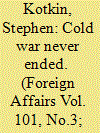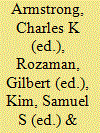| Srl | Item |
| 1 |
ID:
186883


|
|
|
| 2 |
ID:
068095


|
|
|
|
|
| Publication |
Armonk, M E Sharp, 2006.
|
| Description |
xiii, 319p.
|
| Standard Number |
0765616564
|
|
|
|
|
|
|
|
|
|
|
|
Copies: C:1/I:0,R:0,Q:0
Circulation
| Accession# | Call# | Current Location | Status | Policy | Location |
| 050923 | 327.51905/ARM 050923 | Main | On Shelf | General | |
|
|
|
|
| 3 |
ID:
162386


|
|
|
| 4 |
ID:
144599


|
|
|
|
|
| Summary/Abstract |
For half a millennium, Russian foreign policy [1] has been characterized by soaring ambitions that have exceeded the country’s capabilities. Beginning with the reign of Ivan the Terrible in the sixteenth century, Russia managed to expand at an average rate of 50 square miles per day for hundreds of years, eventually covering one-sixth of the earth’s landmass. By 1900, it was the world’s fourth- or fifth-largest industrial power and the largest agricultural producer in Europe. But its per capita GDP reached only 20 percent of the United Kingdom’s and 40 percent of Germany’s. Imperial Russia’s average life span at birth was just 30 years—higher than British India’s (23) but the same as Qing China’s and far below the United Kingdom’s (52), Japan’s (51), and Germany’s (49). Russian literacy in the early twentieth century remained below 33 percent—lower than that of Great Britain in the eighteenth century. These comparisons were all well known by the Russian political establishment [2], because its members traveled to Europe frequently and measured their country against the world’s leaders (something that is true today, as well).
|
|
|
|
|
|
|
|
|
|
|
|
|
|
|
|
| 5 |
ID:
089954


|
|
|
|
|
| Publication |
2009.
|
| Summary/Abstract |
The Chinese-Russian relationship is more opportunistic than strategic, Bobo Lo argues. The United States is stuck watching from the sidelines and may be pushing Moscow further into Beijing's pocket.
|
|
|
|
|
|
|
|
|
|
|
|
|
|
|
|